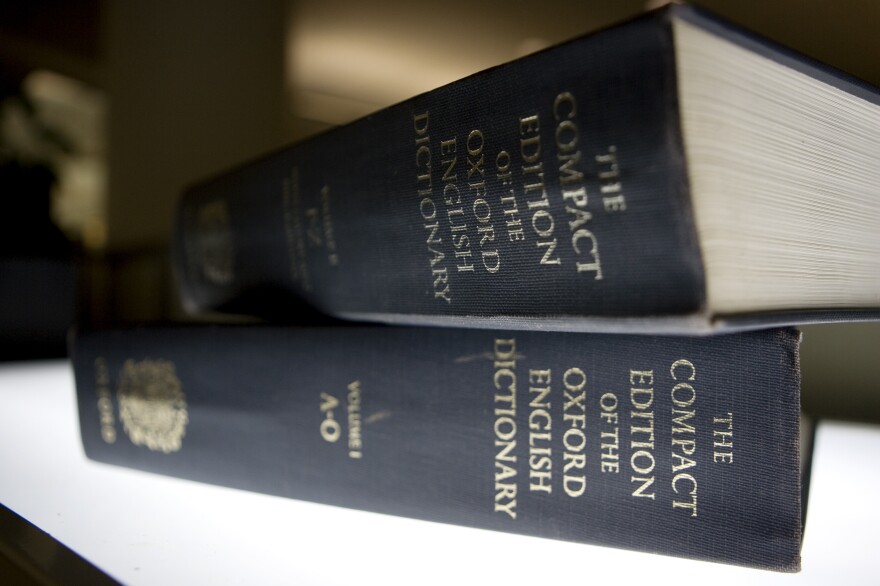The daily lowdown on books, publishing, and the occasional author behaving badly.
The word "tweet" (in the featherless sense) has been added to the Oxford English Dictionary, together with a batch of other tech-y words such as "geekery," "crowdsourcing" and "e-reader." OED chief editor John Simpson writes that adding tweet "breaks at least one OED rule, namely that a new word needs to be current for ten years before consideration for inclusion. But it seems to be catching on." Another entry is "dad dancing," which is defined as an "awkward, unfashionable, or unrestrained style of dancing to pop music, as characteristically performed by middle-aged or older men."
Last week, a provocative article in The Atlantic titled "The Secret to Being Both a Successful Writer and a Mother: Have Just One Kid," by Lauren Sandler was greeted with near-universal derision in literary circles. The piece attracted angry comments by novelists Zadie Smith and Jane Smiley, and journalist Rebecca Mead wrote this in The New Yorker: "There is already enough easily fomented and self-righteous side-taking — between women who opt for motherhood versus those who do not; between stay-at-home versus work-for-pay moms. Now we have new grounds for division: my family structure is more freeing than your family structure." Meanwhile, Sandler says the headline was skewed by The Atlantic.She tweeted that the magazine "stuck a bogus headline on a heartfelt essay about how I found inspiration in four female writers."
Michael Chabon writes about superhero costumes in an endlessly delightful "essay on unitard theory" for The New Yorker: "It was not the red cape any more than it was the boots, the tights, the trunks, or the trademark 'S' that gave Superman the ability to fly. That ability derived from the effects of the rays of our yellow sun on Superman's alien anatomy, which had evolved under the red sun of Krypton. And yet you had only to tie a towel around your shoulders to feel the strange vibratory pulse of flight stirring in the red sun of your heart."
Sunday may have been Bloomsday — when James Joyce fans celebrate in honor of the day on which Ulysses is set — but Monday is Blumesday, as in Judy Blume. Deena Prichep reports for NPR that a holiday has sprung up around the Are You There God? It's Me, Margaret author. Heather Larimer, one of the Blumesday co-founders, told Prichep, "We realized that there is a whole community around this writer that feels just as impassioned about her work as people feel about the work of James Joyce."
For NPR Books, Alexander Nazaryan recommends Eveyn Waugh's Scoop: "As Waugh amply demonstrates in Scoop, journalism is a venal, duplicitous business, powered by ego and vanity. Pity, then, those of us who love it."
The Best Books Coming Out This Week:
Toward the beginning of Neil Gaiman's newest book, the narrator, reading a book of Egyptian myths, thinks, "They weren't adult stories and they weren't children's stories. They were better than that. They just were." The Ocean at the End of the Lane is billed as a book for adults, but like so much of Gaiman's other work, it exists in the liminal space between YA and literary fiction, where grown-up monsters — suicide, adultery, death — coexist with the other, slimier kind. Gaiman recently spoke to NPR's Scott Simon about the book.
The Letters of Italo Calvino,a collection of smart, self-reflective writings translated from Italian by Martin McLaughlin, span the years from World War II to Calvino's death. At one point, he writes, "I'm old-fashioned, bourgeois. My stories are full of facts, they have a beginning and an end. For that reason they will never be able to ... occupy a place in contemporary literature."
Copyright 2020 NPR. To see more, visit https://www.npr.org. 9(MDAwMTM1NDgzMDEyMzg2MDcwMzJjODJiYQ004))
9(MDAwMTM1NDgzMDEyMzg2MDcwMzJjODJiYQ004))

9(MDAwMTM1NDgzMDEyMzg2MDcwMzJjODJiYQ004))